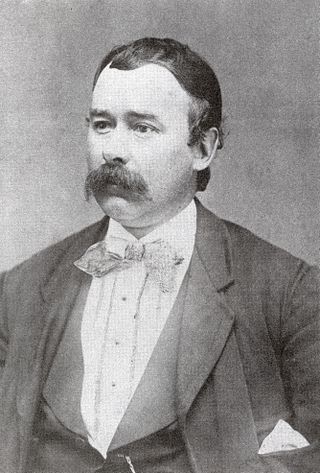Related Research Articles

This section of the Timeline of Quebec history concerns the events relating to the province of Quebec, Canada between the enactment of the British North America Act of 1867 and the end of the 19th century.

Shawn Michael Graham is a Canadian politician, who served as the 31st premier of New Brunswick from 2006 to 2010. He was elected leader of the New Brunswick Liberal Party in 2002 and became premier after his party captured a majority of seats in the 2006 election. After being elected, Graham initiated a number of changes to provincial policy especially in the areas of health care, education and energy. His party was defeated in the New Brunswick provincial election held September 27, 2010, and Graham resigned as Liberal leader on November 9, 2010.
The New Brunswick Liberal Association, more popularly known as the New Brunswick Liberal Party or Liberal Party of New Brunswick, is one of the two major provincial political parties in New Brunswick, Canada. The party descended from both the Confederation Party and the Anti-Confederation Party whose members split into left-wing and right-wing groups following the creation of Canada as a nation in 1867.

The City of Melbourne is a local government area in Victoria, Australia, located in the central city area of Melbourne. In 2021, the city has an area of 37.7 square kilometres (14.6 sq mi) and had a population of 149,615. The city's motto is "Vires acquirit eundo" which means "(She) gathers strength as she goes" or, more figuratively, "(She gathers) strength through progress".

Peter Mitchell was a Canadian politician and one of the Fathers of Confederation.
George Luther Hathaway was a politician in New Brunswick, Canada. His surname also appears as Hatheway.
Canadian Senate divisions refers to two aspects of the Senate of Canada. First, it refers to the division of Canada into four regional Senate divisions of 24 senators each, as set out in section 22 of the Constitution Act, 1867. The four regions are the Western Provinces, Ontario, Quebec and the Maritimes. These regions are intended to serve the Senate's purpose of providing regional representation in the Parliament of Canada, in contrast to the popular representation that the House of Commons is intended to provide. While not within any of the original four Senate divisions, Senate seats are also allocated to Newfoundland and Labrador and the three territories. The four divisions can be expanded when the need arises to have an extra two senators appointed to each regional division.

Maher v Town Council of Portland is a Canadian constitutional law court decision dealing with the constitutional guarantees for denominational schools set out in section 93 of the Constitution Act, 1867. The issue was whether the Common Schools Act, enacted by the Province of New Brunswick in 1871, infringed the guarantee of denominational schools set out in section 93(1).
A local service district (LSD) was a provincial administrative unit for the provision of local services in the Canadian province of New Brunswick. LSDs originally covered areas of the province that maintained some services but were not made municipalities when the province's former county municipalities were dissolved at the start of 1967; eventually all of rural New Brunswick was covered by the LSD system. They were defined in law by the Local Service Districts Regulation of the Municipalities Act. In 2017, the Municipalities Act was replaced by the Local Governance Act, which continued the Local Service Districts Regulation.
The 1892 New Brunswick general election was held in October 1892, to elect 41 members to the 28th New Brunswick Legislative Assembly, the governing house of the province of New Brunswick, Canada. The election was held before the adoption of party labels.
The 1890 New Brunswick general election was held on 20 January 1890, to elect 41 members to the 27th New Brunswick Legislative Assembly, the governing house of the province of New Brunswick, Canada. The election was held before the adoption of party labels.
The 1886 New Brunswick general election was held on 26 April 1886, to elect 41 members to the 26th New Brunswick Legislative Assembly, the governing house of the province of New Brunswick, Canada. The election was held before the adoption of party labels.
The 1882 New Brunswick general election was held in June 1882, to elect 41 members to the 25th New Brunswick Legislative Assembly, the governing house of the province of New Brunswick, Canada. The election was held before the adoption of party labels.
The 1878 New Brunswick general election was held in June 1878, to elect 41 members to the Post-Confederation 24th New Brunswick Legislative Assembly, the governing house of the province of New Brunswick, Canada. The election was held before the adoption of party labels. John James Fraser was appointed premier of New Brunswick on May 4, 1878, following the resignation of George Edwin King, and led his government into the election weeks later.
The 1870 New Brunswick general election was held in June and July 1870, to elect 41 members to the 22nd New Brunswick Legislative Assembly, the governing house of the province of New Brunswick, Canada. The election was held before the adoption of party labels, and was the first since New Brunswick joined the Canadian Confederation in 1867. The elections saw tension between protestants and Catholics over a bill to end public funding of separate religious schools.

New Brunswick has had, since the Legislative Council was abolished by an act passed on 16 April 1891, a unicameral legislature called the New Brunswick Legislature, consisting of the Lieutenant Governor and the Legislative Assembly with 49 seats. The legislature functions according to the Westminster system of government. Elections are now held at least every five years but may be called at any time by the lieutenant governor on consultation with the premier.

Lévite Thériault was a land owner and political figure in New Brunswick. He represented Victoria County from 1868 to 1874 and Madawaska County from 1874 to 1882 and from 1886 to 1894 in the Legislative Assembly of New Brunswick.
Urbain Johnson was a farmer and political figure in the Canadian province of New Brunswick. He represented Kent County in the Legislative Assembly of New Brunswick from 1869 to 1870, from 1874 to 1882 and from 1895 to 1908 as a Liberal member.
The Common Schools Act of 1871 was legislation of the Canadian Province of New Brunswick, passed by the 22nd New Brunswick Legislative Assembly, which replaced the Parish Schools Act of 1858. The legislation aimed to abolish church-run schooling in New Brunswick and replace it with a system of government-run "common schools." The case of Maher v. Town Council of Portland was initiated as a result, and in the end, the Judicial Committee of the Privy Council upheld the Act. The Act was stridently opposed by the Roman Catholic Church and its adherents, and a series of clashes between New Brunswick Catholics and the provincial government culminated in the shooting of two people following riots at Caraquet in 1875, after which the Act was substantially amended to implement a joint religious/secular schooling system.
Local government in New Jersey is composed of counties and municipalities. Local jurisdictions in New Jersey differ from those in some other states because every square foot of the state is part of exactly one municipality; each of the 564 municipalities is in exactly one county; and each of the 21 counties has more than one municipality. New Jersey has no independent cities, or consolidated city-counties.
References
- History of New Brunswick Provincial Election Campaigns and Platforms 1866-1974, CA Woodward (1976) ISBN 0-88892-400-3